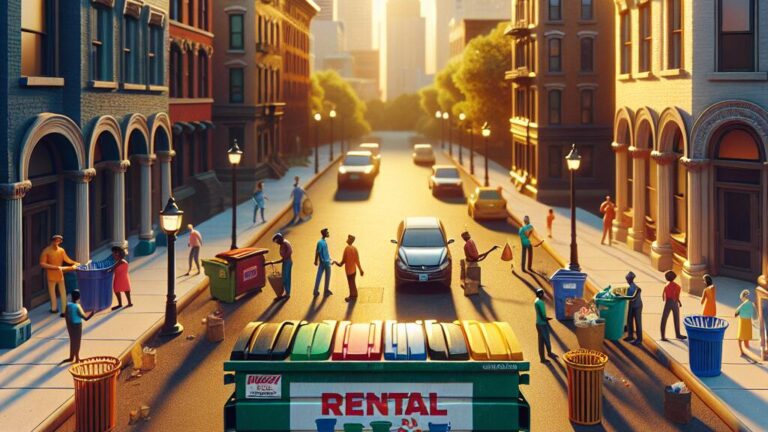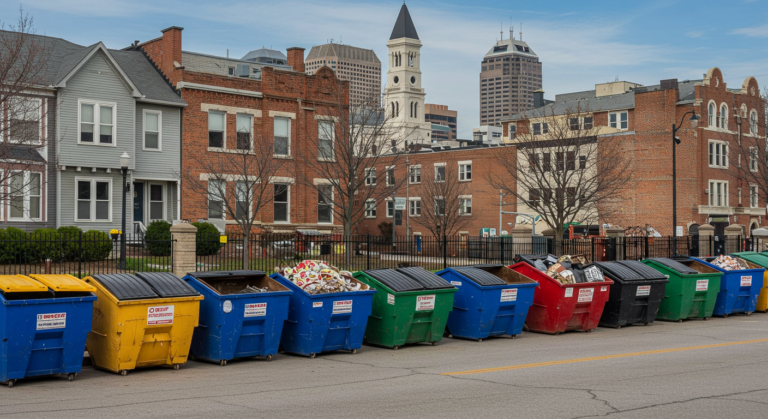How to Choose the Right Residential Dumpster for Your Needs
Table Of Contents
How to Choose the Right Residential Dumpster for Your Needs: A Comprehensive Guide
Key Takeaways
- Assess your project needs to determine the appropriate dumpster size and type.
- Compare various dumpster choices to find the most suitable option for your requirements.
- Select the ideal container based on your specific needs and project scope.
- Familiarize yourself with the rental process for residential dumpsters to ensure a smooth experience.
How To Choose The Right Residential Dumpster For Your Needs | Understanding Your Project Requirements
Understanding the scope of your project is essential for How to Choose the Right Residential Dumpster for Your Needs. Assess the type and volume of debris you’ll be dealing with, whether it’s household waste from spring cleaning, construction waste from a renovation, or junk removal for bulky items. Different projects may require specific dumpster sizes, such as roll-off dumpsters for larger loads or specialized construction dumpsters. Consider the frequency of garbage truck pickups in your area, landfill regulations, and how much trash or construction debris you anticipate generating. For apartments or residential construction sites, choosing the right dumpster size can streamline your cleanup and avoid overflow that would otherwise lead to extra trash bags or reliance on trash cans. Evaluating these requirements will guide you in selecting a suitable dumpster that meets your needs efficiently.
How to Choose the Right Residential Dumpster for Your Needs | Assessing the Scope of Your Cleanup
Assessing the scope of your cleanup is crucial to choosing the right residential dumpster for your needs. Consider the type and amount of waste you will be dealing with, such as yard waste from landscaping or garbage from a home renovation project. Evaluating whether you have heavier materials like concrete or hazardous waste impacts your choice of options. Understanding the volume of trash bags and other waste materials helps determine the appropriate dumpster size to accommodate everything without overflowing, ensuring efficient waste disposal.
Your driveway can affect the size and type of dumpster you select, as space constraints may limit options. For extensive projects like garage cleanouts or major renovations, larger dumpsters are often necessary to manage waste removal effectively. Be mindful of your local recycling centers’ guidelines, as some materials may need separate pickup. Knowing what goes in the dumpster versus what should be taken to a hazardous waste facility ensures compliance with waste disposal regulations. Taking these factors into account helps streamline the cleanup process and makes selecting the right dumpster easier.
Identifying Specific Dumpster Requirements
Choosing the right residential dumpster requires an understanding of specific project needs. Consider the type of waste generation associated with your cleanup, whether it’s debris from home renovations or mixed waste from yard cleanups. Residents in urban areas often face regulations concerning disposal methods and recycling protocols. Single-family homes may generate varying amounts of waste that can include concrete, yard debris, and renovation materials. Knowing how to choose the right residential dumpster for your needs can streamline the waste management process and ensure compliance with local laws.
Evaluating the specific requirements of your project is essential for effective disposal. Identify the volume and type of waste that will be generated, as different dumpsters cater to varying needs. For instance, a pickup truck load of debris may require a smaller dumpster, while extensive home renovations might necessitate larger options. Understanding factors such as the weight limits and what types of materials are acceptable can help maximize the efficiency of your dumpster rental. Proper identification of your waste needs simplifies how to choose the right residential dumpster for your needs while promoting responsible waste disposal.
Evaluating Residential Dumpster Options
Understanding how to choose the right residential dumpster for your needs begins with evaluating the range of options available. Several factors determine the appropriate dumpster for your project, including the type of debris you are disposing of and the volume of waste. Residential dumpster sizes vary, and selecting the right dumpster involves considering what fits your specific situation. For smaller cleanups, a 15-yard dumpster option may suffice, while larger projects may require a more substantial rental dumpster. Assessing dumpster placement is crucial to ensure accessibility for the dumpster provider and compliance with local regulations. By identifying your needs and comparing the options, you can make an informed decision that aligns with your cleanup project. Custom-tailored dumpster rentals offer flexibility, ensuring you have the right dumpster for your cleanup efforts.
Types of Residential Dumpsters Available
Understanding the various types of residential dumpsters available is essential for effective waste management. The 40-yard dumpster is often suitable for larger projects, making it an appropriate choice for substantial renovations or cleanouts. Standard dumpster sizes range from 2-yard dumpsters to more expansive options, allowing you to select the right size dumpster that meets your specific needs. For everyday use, a common dumpster could work well, especially for smaller cleanups. Dumpster rental services often provide a free dumpster delivery option depending on your location, facilitating easier access to the right dumpster size for your project.
Customization is key when considering specialized dumpsters tailored to specific waste types. Some projects might require a second dumpster if the primary one reaches its full capacity quickly. Understanding how to choose the right residential dumpster for your needs will greatly enhance the efficiency of your cleanup. Regular dumpster pickups ensure that waste is managed promptly, preventing overflow and maintaining a tidy work site. Choosing the perfect dumpster helps streamline the process, ensuring you have the appropriate dumpster rental services to see your project completed smoothly.
Comparing Different Sizes and Dimensions
Selecting the appropriate dumpster size is crucial for efficient waste management. Understanding how to choose the right residential dumpster for your needs involves evaluating the available dumpster sizes in relation to your project. A 10-yard dumpster may be ideal for small cleanouts, while a 15-yard dumpster is well-suited for mid-sized renovations. If your project entails larger debris loads, a 20-yard dumpster accommodates a broader scope. Assessing the dimensions can help you determine if your project requires a specialized, customized dumpster plan or a more standard roll-off dumpster rental.
Having the right roll-off dumpster can significantly impact the effectiveness of your cleanup efforts. Each type of dumpster offers varying capacities, which can affect how much waste you can manage at one time. Opting for an appropriate size dumpster ensures you avoid overloading or running out of space. For those uncertain about their needs, ordering an additional dumpster online can provide flexibility. Always consider the specifics of your project to pinpoint the suitable dumpster size, whether it’s a reliable 10-yard dumpster or a larger option like a 20-yard dumpster.
Choosing the Right Dumpster for Your Needs
Selecting the ideal dumpster size is crucial for a successful cleanup project. Understanding how to choose the right residential dumpster for your needs involves assessing the scope of your task and identifying the correct dumpster size. For smaller projects, options like a 4-yard dumpster or an 8-yard dumpster might suffice, while more extensive renovations may require a 20-yard dumpster or a larger 40-yard dumpster. Roll-off dumpster rentals provide flexibility with various available dumpsters tailored to specific job requirements. Knowing the ideal roll-off dumpster and the proper placement can maximize efficiency. Professional dumpster services can assist in determining the chosen dumpster size that aligns with project needs, ensuring you achieve a seamless cleanup experience.
- Determine the volume of debris you’ll generate to assess the appropriate size.
- Consider the length of your project to decide on the rental duration.
- Evaluate whether you need a standard dumpster or a specialized option (like a yard waste dumpster).
- Check local regulations regarding dumpster placement and permits needed.
- Seek recommendations from professionals or previous customers for reliable dumpster services.
- Plan for accessibility to ensure the dumpster can be easily reached for loading.
- Compare prices and services from multiple providers to find the best deal.
Factors to Consider When Selecting a Dumpster
Selecting the right dumpster is crucial for the success of your project. Understanding how to choose the right residential dumpster for your needs starts with knowing the different dumpster sizes available. Common dumpster sizes range from small 15-yard roll-off dumpsters to large 40-yard dumpsters. The perfect dumpster size depends on the volume of waste generated from your cleanup. A reliable dumpster company can help guide you through options like the 30-yard dumpster, ensuring you select a container that meets your specific requirements.
Considering the dimensions and weight limits is essential in the dumpster selection process. Each of the different dumpster containers has distinct size specifications that can affect your project. Using a dumpster size guide can provide insights into typical dumpster sizes and the project types they are suitable for. Opting for a 40-yard dumpster ensures that you have ample space for larger projects, while a 15-yard roll-off dumpster may suffice for smaller undertakings. Choosing the right size from various roll-off dumpster services will streamline your cleanup and maximize efficiency.
Cost Considerations for Residential Dumpsters
Determining roll-off dumpster costs is essential for budgeting your cleanup project. Prices can vary significantly based on factors like size dumpster selection and the type of project being undertaken. Standard-sized dumpsters, such as the 10-yard roll-off dumpster and 20-yard roll-off dumpster, have set rates that can help you gauge the expected expenses. Understanding how roll-off dumpster efficiency relates to the capacity required is vital. If you underestimate the size, you might end up with a half-empty dumpster, leading to extra trips and costs.
Different roll-off dumpster sizes cater to varied project needs. Small dumpsters are ideal for minor renovations or cleanouts, while larger options like the 20-yard dumpster measures up perfectly for substantial projects. Separating waste types could also influence rental costs, especially when needing separate dumpsters for recyclable materials. Understanding the implications of choosing larger versus smaller dumpsters can help streamline both costs and efficiency, making it easier to decide how to choose the right residential dumpster for your needs.
Navigating Residential Dumpster Rental Process
Understanding how to navigate the residential dumpster rental process is essential for a successful cleanup project. Start by assessing the different dumpster dimensions available, such as 10-yard dumpsters for small projects or 40-yard dumpsters for larger renovations. A dumpster size comparison can help determine which option suits your needs best, whether you require front-load dumpsters for regular trash removal or specialized dumpsters for hazardous waste disposal. Reputable dumpster providers often offer a range of roll-off dumpster sizes, including popular 20-yard and 30-yard dumpsters, to accommodate various project scopes. Identifying whether a perfect roll-off dumpster is necessary will ensure efficiency and safety during your cleanup. Look for options that may include a discount dumpster to save on costs while ensuring you have adequate space for your waste. Knowing how to choose the right residential dumpster for your needs will streamline the booking process and lead to a smoother overall experience.
How to Effectively Book a Dumpster
Booking a dumpster requires careful consideration of your project’s specific needs. Understanding how to choose the right residential dumpster for your needs is essential for a successful residential cleanout. A 10-yard dumpster suits smaller projects, while a large roll-off dumpster may be necessary for extensive renovations. Ensure your choice aligns with the scope of work to avoid overloaded dumpsters. Consider whether a seamless dumpster or a rear-load dumpster best fits your residential area. If your project requires dumping multiple types of materials, be prepared to rent different dumpsters as needed.
The rental process for residential dumpsters can vary based on the service provider. Research options for roll-off dumpsters and heavy dumpsters, keeping in mind the size and weight capacity. A seasoned roll-off dumpster offers flexibility for various projects, but be aware of specific restrictions imposed by your local regulations. Understanding rental terms and conditions is crucial, as some companies may limit the duration of use or impose fees for additional dumping. Before finalizing your booking, confirm that the dumpster type you select will adequately meet the demands of your cleanout project.
| Dumpster Size | Typical Use | Weight Capacity | Dimensions (L x W x H) | Best For |
|---|---|---|---|---|
| 10 Yard | Small cleanouts | 2,000 lbs | 12′ x 8′ x 3.5′ | Garage cleanouts, small renovations |
| 20 Yard | Medium projects | 4,000 lbs | 22′ x 8′ x 4.5′ | Home remodeling, large yard waste |
| 30 Yard | Large renovations | 6,000 lbs | 22′ x 8′ x 6′ | Commercial projects, major cleanouts |
| 40 Yard | Extensive construction | 8,000 lbs | 22′ x 8′ x 8′ | New builds, large demolition |
Understanding Rental Terms and Conditions
Understanding the rental terms and conditions is crucial for managing your waste disposal requirements effectively. This step is key to How to Choose the Right Residential Dumpster for Your Needs, especially if you’re planning on tackling residential cleanouts or home renovation waste. Knowing the specifics about pickup options and any potential fees can prevent misunderstandings between you and the discount dumpster team. Ensuring clarity around rental periods and what types of materials are permitted in inert dumpsters will streamline your residential projects.
It’s also important to consider your future waste needs while evaluating the rental terms. Whether working on residential construction projects or regular household junk disposal, being aware of the limitations and obligations outlined in the rental agreement helps you stay informed. You can avoid extra costs and ensure a smoother process for your residential cleanout projects by confirming details about residential driveway access and any potential restrictions on waste disposal needs.
Conclusion
Selecting the right residential dumpster is crucial for effectively managing your disposal needs and ensuring a smooth cleanup process. Understanding your specific disposal requirements will help you navigate the options available, from sizes to types suited for various projects. Whether you have a small renovation or a large cleanup, making informed decisions will protect your residential driveways and minimize any inconvenience. A well-chosen dumpster not only handles disposal needs efficiently but also enhances the overall experience for homeowners tackling projects on their residential properties. Knowing how to choose the right residential dumpster for your needs can significantly impact the success of your cleanup efforts.
FAQS
What factors should I consider when choosing a dumpster, particularly regarding residential dumpster dimensions?
When choosing a dumpster, especially for residential use, it’s important to consider the dumpster size selection and how it matches your waste removal needs. Different dumpster sizes, like a 40-yard dumpster or a 6-yard dumpster, have specific dimensions that can accommodate various types of debris. To find the appropriate roll-off dumpster for your needs, think about the volume of waste you’ll be disposing of. Residential dumpster dimensions can vary, so choosing a dumpster that suits your project is crucial. Additionally, for customized dumpster plans, be sure to check if the dumpster you’re considering can handle the specific materials you’re discarding, such as in the case of hazardous waste dumpsters.
How does the choice of a roll off dumpster impact residential areas and their disposal needs?
Selecting a suitable roll off dumpster can greatly affect residential areas, especially when considering the recommended dumpster size for each project. It’s important to understand that a full dumpster can lead to issues if it exceeds the correct dumpster sizes needed for your disposal needs. For instance, choosing a large dumpster like a 40-yard dumpster—appropriate for major renovations—can provide enough capacity to handle bulk waste, while smaller options such as 20-yard dumpsters may suit lighter tasks. Additionally, self-service dumpster rental options ensure that residents in commercial areas have access to the necessary dumpster sizes without inconvenience, thereby streamlining roll-off dumpster placement and disposal processes.
How do I determine the suitable dumpster capacity for my project and understand the differences in dumpster sizes available?
Choosing the suitable dumpster capacity is crucial for effective waste management. Understanding dumpster size—like large dumpsters or rear-load dumpsters—can help you match the right dumpster rentals to your project requirements. The roll-off dumpster varies in sizes, which makes it important to assess your disposal needs, whether you need a commercial dumpster or multiple dumpsters for larger projects. Proper selection can prevent issues as a dumpster doesn’t operate efficiently if it’s not appropriately sized for the amount of waste generated.
What considerations should I keep in mind when selecting between residential versus commercial dumpster sizes for effective waste management?
When choosing between residential versus commercial dumpster sizes, it’s essential to evaluate your specific disposal needs. Residential options often cater to home projects while commercial sizes are more suited for businesses. Understanding these differences can aid in selecting the right size. Be sure to consider how the volume of waste you plan to handle compares to typical landfills. Additionally, researching various wright dumpster rentals can help you find a service that offers the best solution for your requirements, including options for roll-off dumpster business needs and the convenience of inside dumpsters for easy access.
When evaluating options for renting a dumpster, how do I ensure it can effectively handle disposal needs in a residential setup?
To ensure your rented dumpster can handle disposal needs effectively in a residential setup, consider the size of the dumpster, the type of waste you need to dispose of, and the duration of your project. Choosing the right dimensions and capacity will help you manage your waste efficiently and avoid overflow or excess trips to the disposal facility.







